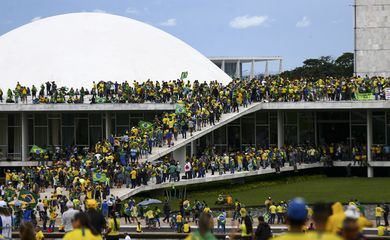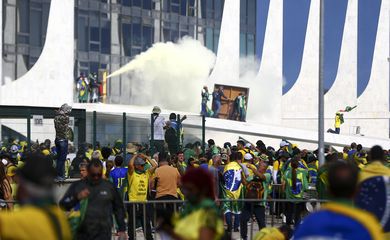Historian on coup attempt: “Serious facts and a bet on chaos”

“The facts were very serious and went beyond speeches and political tension against democracy—they actively sought social chaos and the return of dictatorship,” said historian Marcos Napolitano, a professor of History at the University of São Paulo (USP), a researcher at the São Paulo Research Foundation (FAPESP), and a specialist in the Brazilian republic with a focus on the military period. He shared his assessment of the Federal Police's recent revelations about the attempted coup against the country's democracy.

According to Napolitano, the Federal Supreme Court and the Federal Police fulfilled their duties, “which is already a step forward.” Now, it is necessary to wait for the Attorney General's Office which will decide whether to open an investigation into the responsibilities of those involved in the coup attempt, which was encouraged during the government of then-President Jair Bolsonaro.
The historian noted that one of the key reasons the coup attempt failed was the stronger liberal-democratic consensus within political and legal institutions compared to the past. However, he emphasized that the primary factor behind the coup's failure was the lack of organization and institutional backing, particularly from liberal sectors and the middle class. “This time, they did not join the adventure, unlike in 2016,” he said, referring to the controversial impeachment of former President Dilma Rousseff by Congress.
“The 2022 coup plotters had a reasonable level of support within society. However, without institutional backing from the Armed Forces, organized political groups such as parties and civil associations, the press, or parliament, coups are unlikely to succeed,” Napolitano explained. “That said, this does not diminish the gravity of the crime committed against democracy by civilian and military leaders between 2022 and early 2023.”
The researcher noted that in the recent coup attempt, “the leaders and sympathizers of the far-right were encouraged by the 2016 coup, which was essentially a parliamentary coup supported by social and legal forces.” However, he added, “they were left with the feeling that the job was incomplete, as Lula could still return to power through elections.”
Other coups
Napolitano pointed out that there were numerous coup attempts between 1950 and 1964, “some of them utterly foolish and absurd.” He remarked, “The coup plotters learned from their mistakes and were better organized by 1964.” For this reason, the researcher emphasized the need to “remain vigilant, hold those responsible for coup attempts accountable, and avoid falling into the overly optimistic narrative that ‘our institutions are strong’ or ‘society no longer tolerates coups.’”
To build a stronger foundation for Brazilian democracy and prevent future coup attempts, Napolitano argues that it is essential to “foster the belief in democracy and promote negotiated approaches to conflict resolution in the daily lives of ordinary citizens across all classes and social groups—in schools, churches, families, and neighborhoods.” However, he cautions: “This is a challenging task in a country marked by extreme inequality, widespread violence, and a persistent authoritarian political culture, even among institutional actors themselves.”
Napolitano also emphasizes the need for “political elites across all ideologies to actively isolate adventurers and coup plotters who occasionally arise within the political system, while committing to managing the country in a minimally decent and republican manner.” He concludes: “And finally, punish civilian and military coup plotters in an exemplary manner, strictly within the framework of the law.”






